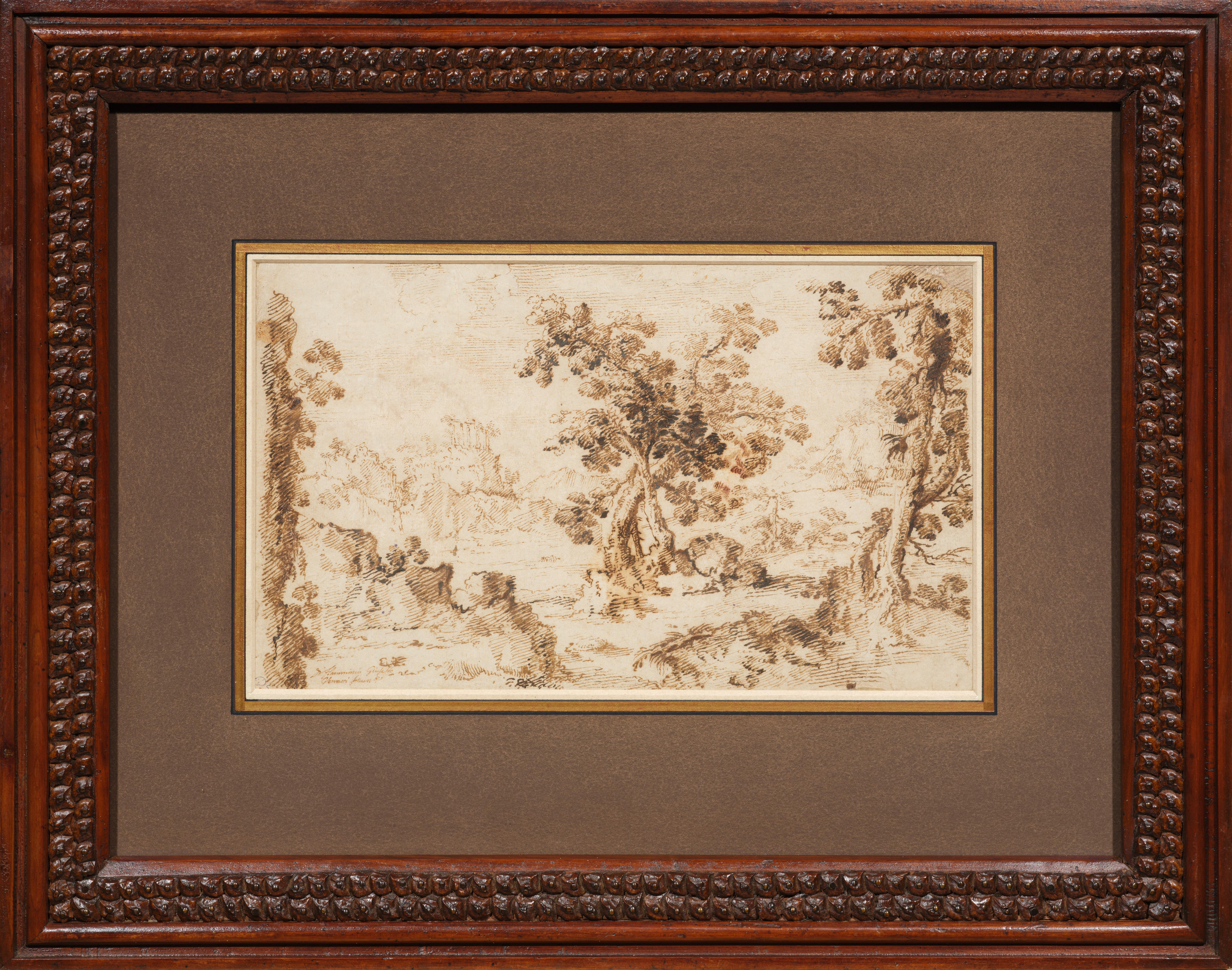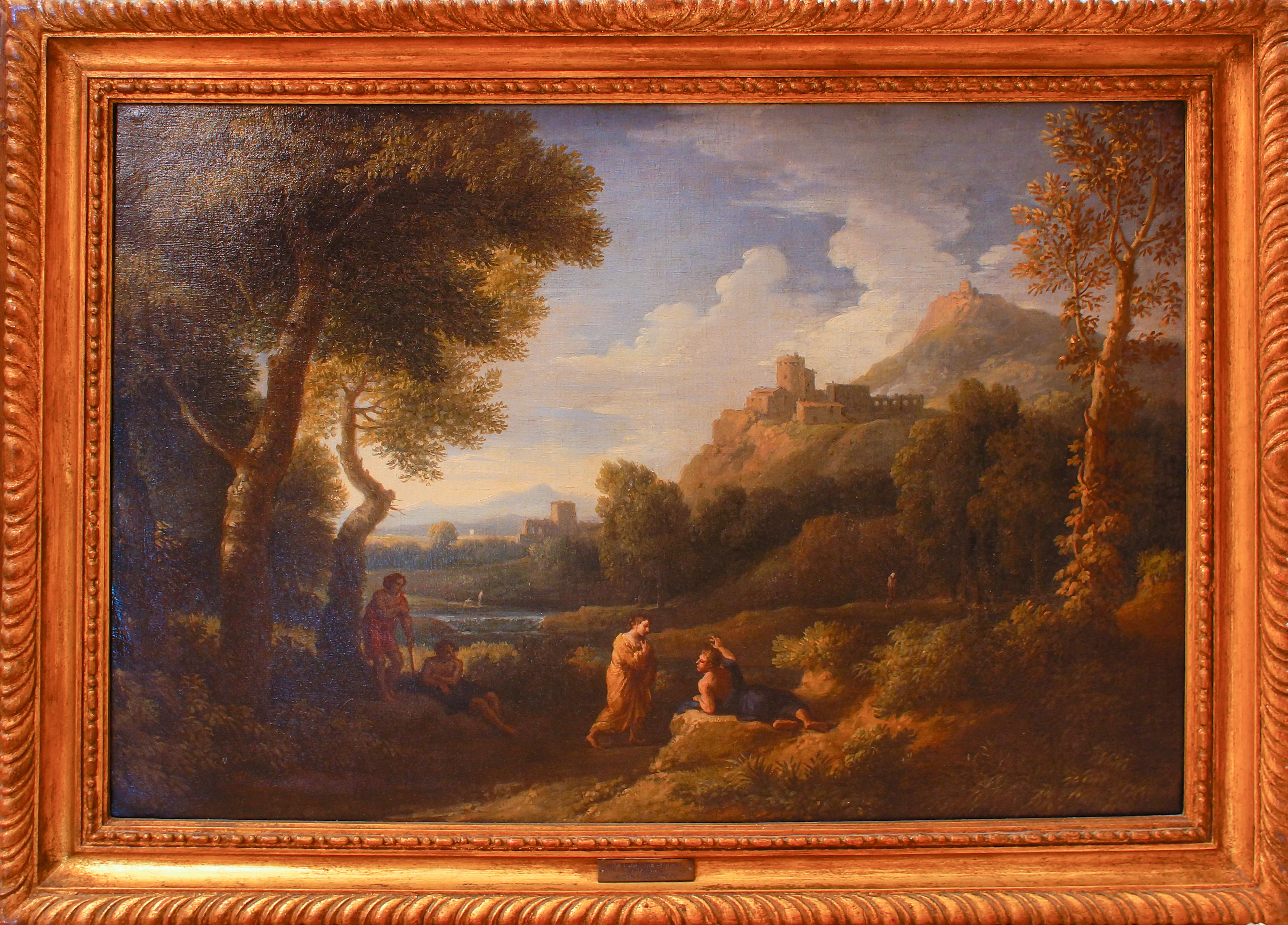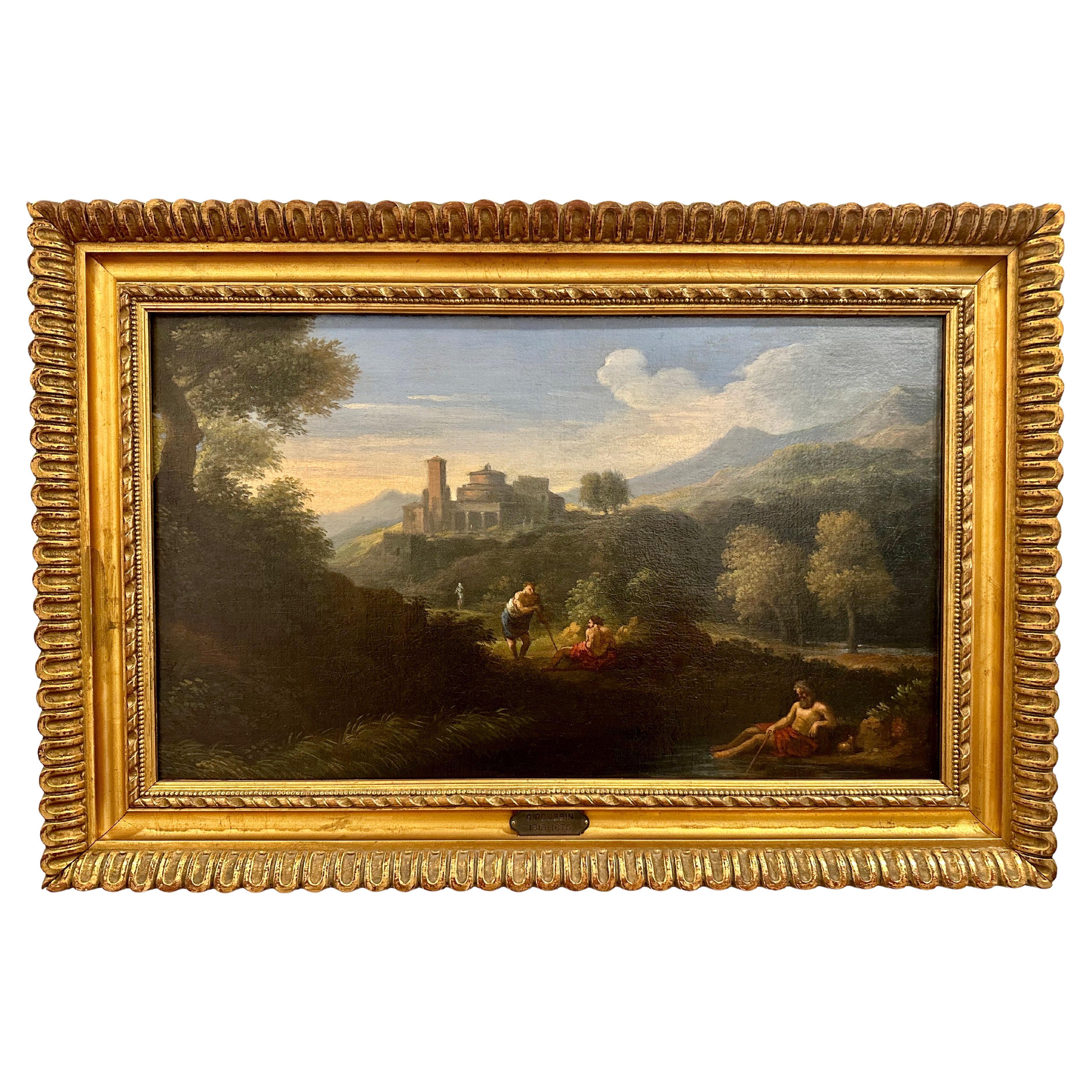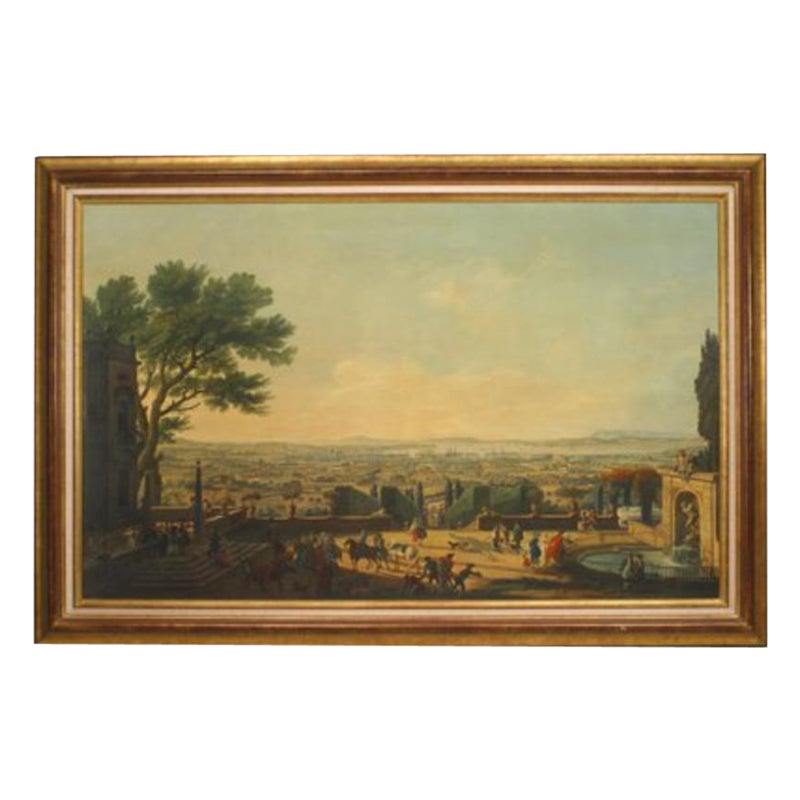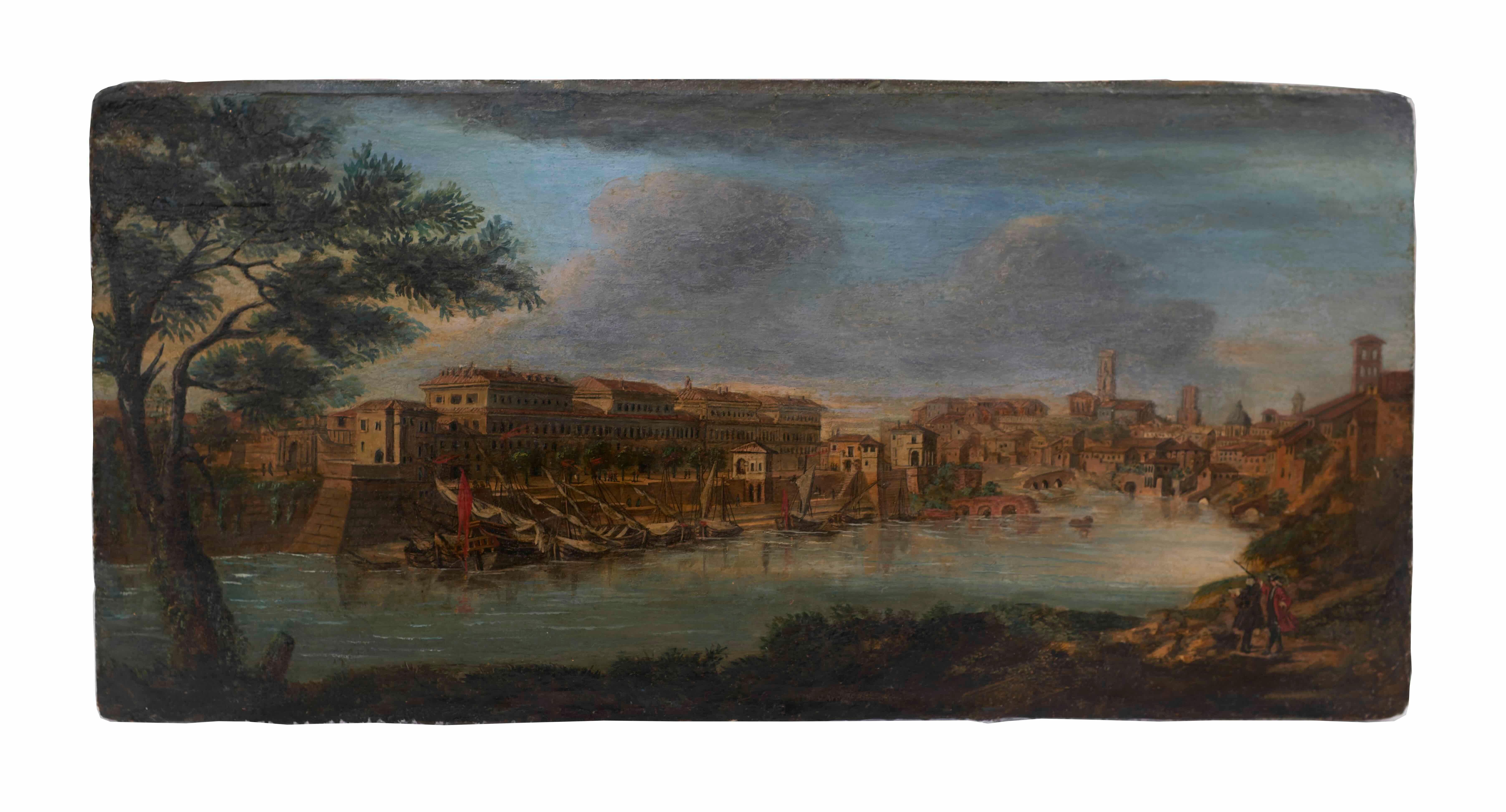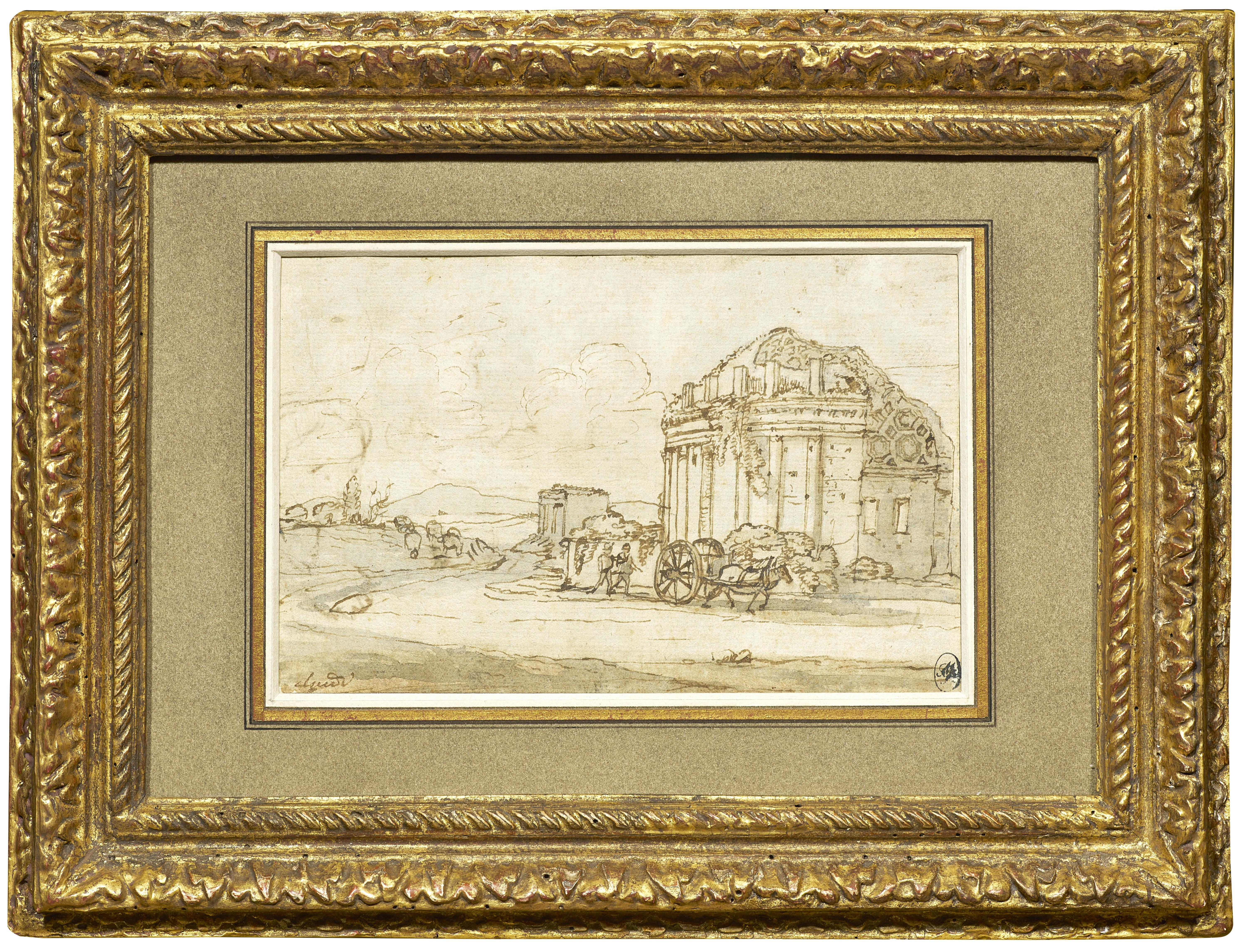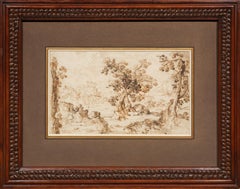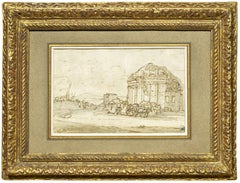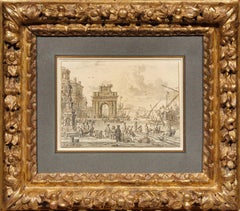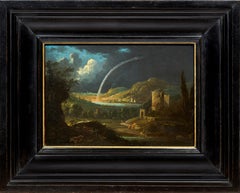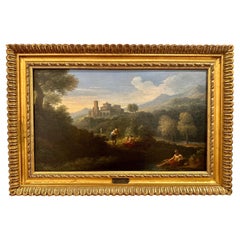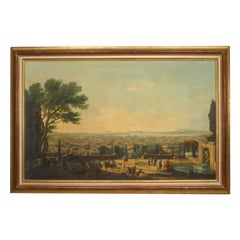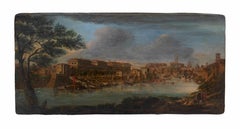Items Similar to View of an Antique City, a wash landscape by Jan de Bisschop (1628 - 1671)
Want more images or videos?
Request additional images or videos from the seller
1 of 9
Jan de BisschopView of an Antique City, a wash landscape by Jan de Bisschop (1628 - 1671)
$7,195.07
£5,352.41
€6,000
CA$9,852.52
A$10,954.66
CHF 5,719.92
MX$133,344.86
NOK 72,983.66
SEK 68,382.20
DKK 45,674.69
Shipping
Retrieving quote...The 1stDibs Promise:
Authenticity Guarantee,
Money-Back Guarantee,
24-Hour Cancellation
About the Item
The attribution to Jan de Bisschop has been confirmed by the RKD with the following comment: "We base this attribution on the dark washes, the subject represented and the monogram".
This powerful wash with warm hues is highly evocative of the talent of Jan de Bisschop, an amateur artist of the Dutch Golden Age. He is an endearing character: although most of his work, consisting mainly of landscapes and reproductions of artworks, is largely inspired by Italy, he probably never went to Italy. An amateur artist, he nevertheless had a real influence on other artists of his time, such as in particular his friend Jacob van der Ulft.
1. Jan de Bisschop, lawyer and amateur painter and engraver
Despite his amateur status, Jan de Bisschop (also known as Johannes Episcopius) was widely influential in art and art publishing. Born in Amsterdam in 1628, he became a lawyer and set up practice in The Hague around 1652. He later founded a drawing academy there. He mingled with an elite circle of intellectuals that included his friend and fellow amateur draftsman Constantijn Huygens the Younger (1628 - 1697).
Bartholomeus Breenbergh (1598 - 1657), who lived in de Bisschop's native Amsterdam after a long stay in Rome (between 1619 and 1630), most influenced de Bisschop's draftsmanship. De Bisschop's landscapes in brown ink wash imitated Breenbergh's evocations of Italianate sunlight. Despite drawing numerous Italianate landscapes, de Bisschop probably never went to Italy; other artists' works were his sources. Whether drawing with pen or brush, de Bisschop used a warm golden-brown ink, later named "bisschops-inkt" after him. De Bisschop in his turn had a great influence on his friend Jacob van der Ulft.
In addition to landscapes, de Bisschop made figure studies and drawings after classical sculptures and famous paintings, primarily by Italian artists. His publications, which reproduced antique sculptures and Old Master drawings, were instrumental in disseminating the classical style in Holland. He also designed title pages for books, mostly by classical authors, and published his own compositions.
2. Description of the artwork
Behind a lake that appears to be cascading down a waterfall, framed by two trees, the landscape presented here by James de Bisschop evokes an ideal city surrounded by walls, into which opens a gateway flanked by two towers that can be seen on the left. The city is dominated by an amphitheatre that seems disproportionately high for its circumference. An obelisk and a building with a dome reminiscent of the Pantheon in Rome complete this reference to antiquity.
It is to be noted that the upper part of our drawing (including the large tree on the left) is on a different sheet which has been pasted with the lower part’s one. This technique was widely used in the 17th century at a time when paper was costly to hide a mistake or allow some reworking while keeping the largest part of a drawing.
Two related drawings in the Amsterdam Rijksmuseum illustrate Bisschop's highly specific technique (and his taste for oblong formats): Mountain Landscape in Italy (RP-T- 1898-A-3528. 118 x 209 mm - 4th photo in the gallery) and Colosseum in Rome with Buildings (RP-T-1909-39. 124 x 208 mm - last photo in the gallery).
- Creator:Jan de Bisschop (1652 - 1726)
- Dimensions:Height: 13.75 in (34.93 cm)Width: 18.5 in (46.99 cm)
- Medium:
- Movement & Style:
- Period:
- Condition:20 x 32 cm (77/8 '' x 125/8 '') - Framed 35 x 47 cm (133/4 '' x 18 ½'') Signed with the initials "JB" lower right Louis XVI style carved and gilded wood frame.
- Gallery Location:PARIS, FR
- Reference Number:1stDibs: LU1568214052352
About the Seller
5.0
Vetted Professional Seller
Every seller passes strict standards for authenticity and reliability
Established in 2020
1stDibs seller since 2021
10 sales on 1stDibs
Typical response time: 2 hours
- ShippingRetrieving quote...Shipping from: PARIS, France
- Return Policy
Authenticity Guarantee
In the unlikely event there’s an issue with an item’s authenticity, contact us within 1 year for a full refund. DetailsMoney-Back Guarantee
If your item is not as described, is damaged in transit, or does not arrive, contact us within 7 days for a full refund. Details24-Hour Cancellation
You have a 24-hour grace period in which to reconsider your purchase, with no questions asked.Vetted Professional Sellers
Our world-class sellers must adhere to strict standards for service and quality, maintaining the integrity of our listings.Price-Match Guarantee
If you find that a seller listed the same item for a lower price elsewhere, we’ll match it.Trusted Global Delivery
Our best-in-class carrier network provides specialized shipping options worldwide, including custom delivery.More From This Seller
View AllRocky Landscape with Trees and Temple Ruins a drawing by Giulio Parigi (ca 1615)
Located in PARIS, FR
This Rocky Landscape with Trees and the Ruins of a Temple is a drawing by Giulio Parigi, an eclectic and prolific artist of the Medici court. An engraver, architect, furniture and je...
Category
1610s Old Masters Landscape Drawings and Watercolors
Materials
Ink, Laid Paper, Pen
A landscape drawing by Claude Lorrain, with a preliminary sketch on the verso
By Claude Lorrain
Located in PARIS, FR
This study presents a typical Roman countryside landscape: an ancient mausoleum in front of which a cart is passing by followed by two peasants. If the technique (a pen drawing on graphite lines, completed with a wash of brown and grey inks) and the signature inevitably evoke the art of Lorrain, we find on the verso of this drawing additional evidences that lead us to consider this unpublished drawing as a work by the master.
The motif of the mausoleum has been taken up in pen on the verso in a technique that can be found in several other drawings by Lorrain. There is also a study of three characters, which can be considered as preparatory to Lorrain’s painting entitled The Port of Ostia with the Embarkation of Saint Paula, leading us to claim this attribution with a dating of around 1639.
1. Claude Lorrain or the perfection of classical landscape in Rome in the 17th century
Claude Gellée was born in 1600 in Chamagne in Lorraine. Orphaned at the age of twelve, he spent a year with his brother in Freiburg, where the latter was a woodcarver. Claude Gellée then probably arrived in Rome in 1613, where he joined the workshop of Agostino Tassi (1580 - 1644) in 1617. Between 1619 and 1620 he studied for two years in Naples in the workshop of Goffredi Wals (who was himself a former pupil of Tassi).
In 1625 he returned to Lorraine for two years where he worked alongside Claude Deruet. He then returned to Rome, a city he never left for the rest of his life (except for short trips to the surrounding countryside).
From 1627 to 1650 he lived in Via Margutta. From 1635 onwards he became a renowned painter and commissions started to pour in. Considered during his lifetime as the most accomplished of the classical landscape painters, his reputation never faded.
Between 1629 and 1635 Le Lorrain often went to the Roman countryside to draw with his friend Joachim von Sandrart (1606 - 1686). He became a member of the Academy of Saint Luke in 1633, while being closely acquainted with the Bentvueghels, this guild which brought together the young Nordic painters active in Rome. In 1643 he joined the Congregation of the Virtuosi. In 1650 he moved to Via Paolina where he lived until his death.
Little is known of his intimate life. He seems to have had a daughter, Agnes, from an ancillary love affair. In 1657/ 1658 she moved in with him. Stricken with gout in 1663, he died in 1682.
2. Description of the drawing; the technique of nature studies
Two peasants are walking behind a horse-drawn cart on a road that winds through ancient tombs. While a rectangular tomb with a columned facade can be seen in the distance, the cart passes an important ancient building. It has a circular shape and its partially ruined façade is decorated with columns. The start of a second floor can...
Category
1630s Old Masters Landscape Drawings and Watercolors
Materials
Pen, Graphite, Ink
Imaginary View of an Italian Port, a signed and dated drawing by Jacobus Storck
Located in PARIS, FR
In this finely executed pen and wash drawing, Jacobus Storck presents us with an imaginary view in an Italian port. The splendor of the buildings (the large sculpted fountain surmoun...
Category
1680s Old Masters Landscape Drawings and Watercolors
Materials
Paper, Pencil, Pen, Ink
River Landscape with Shepherds and Architecture, a painting by Jan van Bunnik
By Jan van Bunnik
Located in PARIS, FR
This painting has been the subject of a study by the art historian Fabrizio Dassie (available on request), confirming its inclusion in Jan van Bunnik’s corpus.
In this painting, Ja...
Category
Late 17th Century Old Masters Landscape Paintings
Materials
Copper
View of the Posillipo coastline near Naples by William Marlow (1740 - 1813)
By William Marlow
Located in PARIS, FR
In this drawing, inspired by his stay in Naples in 1765, William Marlow presents us with a view of Cape Posillipo, to the west of Naples, an essential stage during the Grand Tour. Th...
Category
1760s Old Masters Landscape Drawings and Watercolors
Materials
Ink
View of Ariccia, a preparatory drawing by Achille Bénouville (1815 - 1891)
Located in PARIS, FR
This very modern drawing presents a view of Ariccia, a small town 25 kilometres south-east of Rome. The Palazzo Chigi (in which the film-maker Luchino Visconti would film a large part of The Leopard a century later) and the adjoining church are seen from the bottom of the ravine that surrounds the town. This drawing is a moving testimony to the attraction of the city for artists of the Romantic period, who established in Ariccia a vivid artists' colony.
1. Achille Bénouville...
Category
1850s Romantic Landscape Drawings and Watercolors
Materials
Ink, Gouache, Pencil
You May Also Like
Pair of Roman Landscapes - by J.F. Van Bloemen - 18th Century
By Jan Frans van Bloemen (Orizzonte)
Located in Roma, IT
Beautiful couple of Roman Landscape by J. F. Van Bloemen, in very good conditions and with later wooden frames.
Bibliography and Exhibitions:
Old Master Exhibition, H.Terry-Engell, ...
Category
Early 18th Century Landscape Paintings
Materials
Oil, Canvas
Jan Frans van Bloemen called Orizzonte (Antwerp 1662-Rome 1749), Roman Landscape
Located in CH
Jan Frans van Bloemen called Orizzonte (Antwerp 1662-Rome 1749).
A Late 17th early 18th century Italian landscape with figures of the Roman Campagna.
...
Category
Antique Late 17th Century Dutch Baroque Paintings
Materials
Canvas
Landscape "The Town and Harbour of Toulon"
Located in Queens, NY
Copy of a landscape painting titled "The Town and Harbour of Toulon" showing expansive view from courtyard with people, horses, and dogs by the sea
Category
Late 20th Century American Louis XV Paintings
Materials
Paint
19th C Painting of View of Venice After Gaspar Van Wittel (1653-1736)
Located in San Francisco, CA
19th C Painting of View of Venice
After Gaspar Van Wittel (1653-1736)
Oil on Wood Panel
Beautifully Restored
Unframed
10" x 13.25
Category
19th Century Landscape Paintings
Materials
Oil, Wood Panel
Francesco Battaglioli (Venetian master) - 18th century painting - Ruins Landscap
By Francesco Battaglioli
Located in Varmo, IT
Francesco Battaglioli (Modena 1710 ca. - Venice post 1796) - Architectural capriccio with characters.
83.5 x 114.5 cm without frame, 98 x 130 cm...
Category
Mid-18th Century Rococo Landscape Paintings
Materials
Canvas, Oil
Capriccio View with Classical Ruins and Santa Maria della Salute
By Gaetano Vetturali (Lucca, 1701-1783)
Located in Stockholm, SE
A Venetian capriccio view with classical architectural ruins and in the background the church of San Giorgio Maggiore and the Church of Santa Maria della Salute next to the Grand Can...
Category
1770s Old Masters Landscape Paintings
Materials
Canvas, Oil
More Ways To Browse
Old Master Italian Drawings
Antique View Master
Jans Antiques
17th Century Italian Landscape
Antique Wash Set
James A Rome
17th Century Italian Drawings
Antique Books Amsterdam
Waterfall Sculpture
Frank Egginton
Freddy Cushing
Gretchen Guard Paintings
Gwyneth Johnstone
Harold Phenix
J A Kirkpatrick
Pirates Alley
Rachel Bentley
Robert Healy
